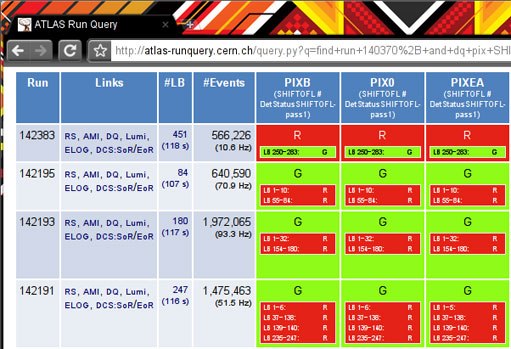
ATLAS e-News
23 February 2011
A daily dose of Data Quality
25 January 2010

A screenshot of the Run Query interface
When ATLAS shifts gear for physics data-taking, so too does the weekly data preparation and data quality meeting. It steps up to a daily schedule as soon as beams start colliding, and can be thought of as the mirror image of the morning run meeting, according to co-Chair Peter Onyisi.
These two meetings bookend each day and are the major touchstones for keeping up with ATLAS happenings. “I’d encourage people to attend if they’re interested in data quality or data preparation issues: Have there been any glitches in the file distribution? Have there been updates in the reconstruction software that we should care about?” says Peter. “The data quality experts tend to be the first to run into offline data preparation issues, so we give a lot of feedback that way.”
In weekly mode, the meeting focuses on software developments and the reprocessing effort. In daily mode, its main agenda is to look back over the last 36 hours or so to make sure people have filed performance reports in the database, to analyse operations trends, and to monitor any new or continuing problems with the sub-detector flags.
“We want to collect all the experts in one place so that, say, if the calorimeters see a problem and they can correlate it with where the jets see a problem and where e-gamma sees a problem, then people can work on these issues together,” says Peter.
In addition to the daily reports, there are also dedicated weekly reports, Monday through Thursday, from different groups. “I like to call them super slices,” smiles Peter. So, for example, on Tuesday – Inner Detector day – they discuss the detectors themselves, alignment, resonance-finding performances, combined performance, tracking triggers, and tracking combined performance.
“Even if people are actually interested in those issues from a higher-level perspective, if they’re interested in one particular system, they’re also invited to come along on the relevant day.”
Peter is keen for anyone who is trying to understand data quality issues for their analyses to get involved, and is particularly interested in finding out from the physics communities about how the data quality flags impact them.
“There’s some vertical integration that needs to be done. We have a lot of communication with the detector systems, and some with combined performance, but then there’s a higher-level analysis community that it would be beneficial if people could at least come and see how the sausage is made.”
The meeting is open to all, transmitted over EVO, and carefully scheduled to avoid all other official meetings. As a weekly meeting during non-collision periods, it is held at 4:30pm on a Tuesday, in building 40. The daily meeting shifts location to Point 1, keeping the same 4:30pm timeslot. Get involved!
 Ceri PerkinsATLAS e-News
|